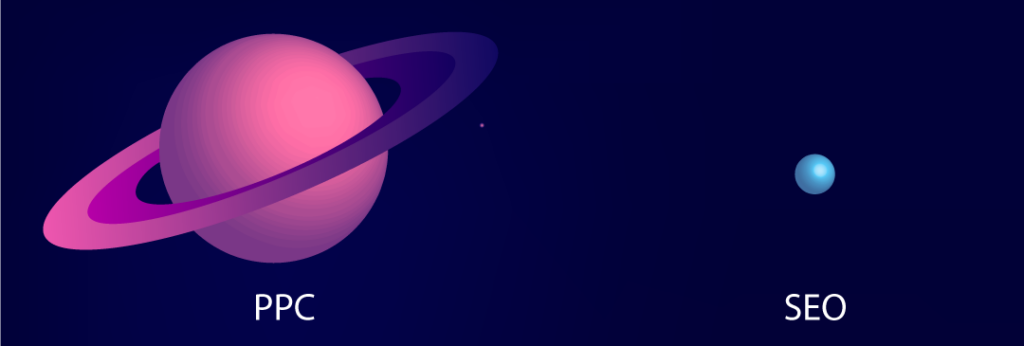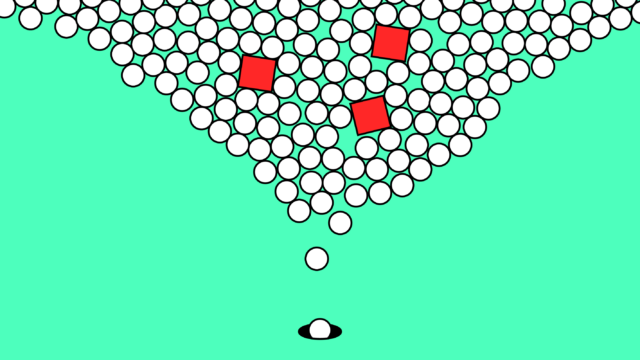Go boldly, and keep searching for those new frontiers

The Oxford English Dictionary minted ‘Google’ as a verb back in June 2006 as it became everyday vocabulary in our vernacular. Since then we could be forgiven for taking search technologies for granted in our lives as they evolve to meet demand. Search has become a tool we, as humans, rely on – which is why Search Marketing is the holy grail of your digital strategy.
Search Marketing (SM) is the strategic process of gaining traffic and exposure through paid search channels – paid ads / Pay Per Click (PPC) and unpaid search – Search Engine Optimisation (SEO).
Two laws of attraction
Since the advent of ‘digital disruption’ (a transformation that results from emerging digital technologies), the way we consume information has changed considerably. People have rapidly moved away from TV and traditional media to online channels. This has put increased pressure on search to satisfy a growing audience that expects results on demand and by command.
Technology allows us to exhaust every avenue with search. That means going beyond Google and Bing (and Baidu and Naver if your business appeals to a global audience). So, as a brand seeking search dominance, it’s vital you work with both paid and organic search. The two should complement each other and work in unison to elevate your brand and broaden your offering.
PPC works in harmony with SEO, covering both bases against competitors. Where SEO pushes you to the top of search rankings organically there’s always tough competition for the words you optimise. Using PPC in tandem allows your content to reach a wider audience as your site will rank instantly and you can analyse the strength of your keyword choice. Here’s how the two go hand in hand…
Your PPC can support SEO:
- Share keyword data: With SEO you have limited visibility of keywords. PPC offers transparency of metrics so you can compare conversion rates and ROI per keyword
- Your best performing PPC keywords can be invested into your SEO strategy to gain greater conversion and support your organic content, whether new or existing
- Adding site links on Google Adwords can support your content – blog posts receive greater click through rates (CTRs) and reach a wider audience which helps increment more sales
Your SEO can support PPC:
- If keywords are too expensive via PPC, focus your SEO strategy around them. It may take longer to see the results but you’ll save money and gain insight
- Boost your keywords with a low-quality score and add SEO content to your landing pages. Relevant content drives conversion. It also reduces your cost per click and improves your ad rank
- Review organic trends – traffic peaks could enhance your PPC strategy and improve performance
Space and time
In the beginning…
…when you first launch your campaign, PPC will dominate a larger proportion of your conversions compared to SEO which takes longer to be effective. However, over time this will shift and the two will balance out and complement each other. Integrating both organic and paid search helps you define the keywords with the highest conversion rate and determine the language and themes that will optimise your campaign strategy. Combine SEO, PPC, Social, PR and Conversion Rate Optimisation (CRO) and you can’t go wrong.
Ready for a search revolution?
Evolving technology and increasing user expectation means search is in a constant cycle of change. No one recognises this more than Google who in June announced their decision to rebrand Google Adwords.
What’s in a name? Google have rebranded ‘Google Adwords’ as ‘Google Ads’ to reduce confusion amongst advertisers. And that’s not all they’ve considered, as their new name is just the first of three planned changes with the service splitting into three major new brands:
- Google Ads – the one-stop search shop for display ads, app ads in Google Play, Google Map listings and You Tube videos. Yet this is more than just a name change. Google Ads is launching ‘Smart Campaigns’ – a default mode for small business advertisers that allows them to establish the actions they’re prioritising (sales, leads, store visits or phone calls)
- Google Marketing Platform – this combines the company’s two analytic tools DoubleClick Digital Marketing and Google Analytics 360
- Google Ad Manager – a platform that combines Google’s monetization tools for publishers, such as DoubleClick Ad Exchange and DoubleClick for Publishers
AI and Voice Search – the unpredictable double act
Artificial intelligence (AI) and voice search are pushing the boundaries of digital marketing and will revolutionise how brands and consumers interact. Voice search began as a primarily mobile-based technology with ‘Siri’ and ‘Google’ acting as the oracle in the palm of our hands. But now we’re relying more on the convenience of voice search with home hubs and smart speakers becoming more popular. Amazon’s Alexa, Google Assistant and Microsoft’s Cortana are just the start of the voice search phenomenon. Without realising it, this technology has conditioned human rhetoric so that we simplify our questions and complete tasks relying on voice-based commands for results. In 2016, Location World found more than 40% of adults used voice-based search on a daily basis. A figure predicted to rise by ComScore to over 50% by 2020.
Voice search is a technology brands can’t afford to ignore.
Like partners in crime, if voice search is Bonnie, AI is Clyde. AI reduces errors in voice search. It translates accents, inflections, dialect and can adjust to different speech patterns to ensure search results are accurate. Sophisticated algorithms are changing the way we, as users, interact with search engines and voice search employs long-tail keywords that rely on natural phrases to achieve results – on demand. There’s so much SEO teams and marketers can learn from this model from keyword use alone. Alexa is the fly on the wall – your eyes and ears waiting for your brand to embrace her super powers.
Visual search
Google, Microsoft and Amazon all allow customers to find search items through image recognition services. This allows companies to integrate powerful visual search into their strategies. In a B2B application, customers can match makes and models of complicated machine parts with ease, share them with sales reps and place orders – all simply through the fast, visual analysis of billions of images.
Why work with us? #everydayinciteful
Your search for an agency that specialises in both SEO and PPC ends here. We understand that an integrated approach maximises your results and gains greater market insight. And as a full service digital agency, we approach search marketing as part of a fully integrated strategy rather than in isolation. We think creatively and embrace new technologies, platforms and techniques that achieve the right results for your brand and business.
We’re here to help your content and customers talk in the same language, using a strategy that sells and keywords that convert. And if you need us – call 0116 254 9888, we’re ready to collaborate, combine PPC and SEO and take your brand and business on a search journey that guarantees results.




